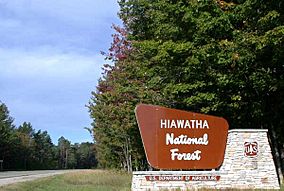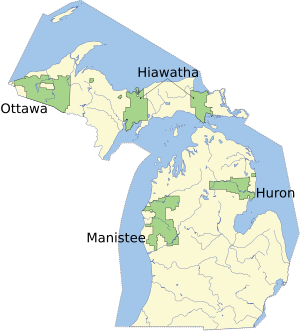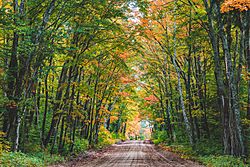Hiawatha National Forest facts for kids
Quick facts for kids Hiawatha National Forest |
|
|---|---|
|
IUCN Category VI (Managed Resource Protected Area)
|
|

Road sign of the Hiawatha National Forest in Alger County
|
|
| Lua error in Module:Location_map at line 420: attempt to index field 'wikibase' (a nil value). | |
| Location | Upper Peninsula of Michigan, United States |
| Nearest city | Escanaba, Michigan |
| Area | 894,836 acres (3,621.27 km2) |
| Established | January 16, 1931 |
| Governing body | U.S. Forest Service |
| Website | Hiawatha National Forest |
The Hiawatha National Forest is a huge natural area in Michigan's Upper Peninsula. It covers about 894,836 acres, which is like having over 677,000 football fields! This special forest is managed by the United States Forest Service. It's actually split into two main parts: the Eastside and the Westside. People can enjoy many outdoor activities here, and some areas are used for carefully managed logging.
Contents
What's in a Name?
The Hiawatha National Forest gets its name from a famous Mohawk chief named Hiawatha. He was known for helping to bring together the Five Nations of the Iroquois. Hiawatha is also the hero of a well-known poem called "The Song of Hiawatha" by Henry Wadsworth Longfellow.
Exploring the Forest's Location
The Hiawatha National Forest stretches across several counties in Michigan. These include Chippewa, Delta, Mackinac, Alger, Schoolcraft, and Marquette counties.
East and West Units
The forest is divided into two main sections. The East Unit is found in Chippewa and Mackinac counties. The West Unit covers the other counties. The East Unit makes up about 44% of the forest. The West Unit is larger, holding about 56% of the forest's total area.
Forest Headquarters and Ranger Stations
The main office for the Hiawatha National Forest is in Gladstone, Michigan. If you need help or information, you can visit a ranger district office. East Unit offices are in Sault Ste. Marie and St. Ignace. West Unit offices are in Manistique, Munising, and Rapid River.
How the Forest Grew
The East Unit was once a sandy area that wasn't used much. In 1909, President Theodore Roosevelt named it the Marquette National Forest. Later, in 1931, the government officially created the Hiawatha National Forest by buying land for the West Unit. Many new trees were planted in this unit by the Civilian Conservation Corps, a group that helped people find jobs during the Great Depression.
Special Wilderness Areas
The Hiawatha National Forest is home to six special wilderness areas. These are places where nature is protected and kept wild. They include:
- Big Island Lake Wilderness
- Delirium Wilderness
- Horseshoe Bay Wilderness
- Mackinac Wilderness
- Rock River Canyon Wilderness
- Round Island Wilderness
Wild and Scenic Rivers
Five rivers within the forest are recognized as National Wild and Scenic Rivers. This means they are protected for their natural beauty and special qualities. These rivers are:
- Carp River
- Indian River
- Sturgeon River
- Tahquamenon River (East Branch)
- Whitefish River
Amazing Wildlife and Nature
The Hiawatha National Forest is full of incredible wildlife! You might spot timber wolves, white-tailed deer, black bears, and even moose. Many birds also live here, like golden eagles, bald eagles, and sandhill cranes. Other animals include coyotes, bobcats, beavers, red foxes, and river otters.
Forest Shorelines
This forest has over 100 miles (160 km) of shoreline! Both the East and West units touch the waters of Lake Superior and Lake Michigan. The East Unit also has shoreline on Lake Huron. It even includes Round Island and its historic lighthouse. The West Unit is next to Pictured Rocks National Lakeshore and the Grand Island National Recreation Area.
Fun Things to Do
The Hiawatha National Forest is a fantastic place for outdoor adventures!
Historic Lighthouses
Along the beautiful shores, you can find several lighthouses. The Point Iroquois Light is now a museum. You can visit it to learn about its history.
Hiking Adventures
If you love to hike, a part of the very long North Country Trail goes right through the forest. This trail is about 4,600 miles (7,400 km) long! It's a great way to explore the forest's natural beauty.
Camping Under the Stars
Camping is a very popular activity in the Hiawatha National Forest. There are many campgrounds where you can set up your tent or park your RV. Some popular spots include:
- AuTrain
- Bay Furnace
- Bay View: This campground is near Brimley on Lake Superior. It has a quiet beach that many visitors enjoy.
- Brevoort Lake
- Camp 7 Lake
- Carp River: Located near the Mackinac Bridge, it's a great spot for fishing.
- Collwell Lake
- Corner Lake
- Flowing Well
- Indian River
- Island Lake
- Lake Michigan: This campground is also near the Mackinac Bridge.
- Little Bass Lake
- Little Bay De Noc
- Monocle Lake Campground: Another popular spot near Brimley and Lake Superior, especially for RVs.
- Petes Lake Campground
- Soldiers Lake Recreation Area
- Three Lakes Campground
- Widewaters Campground
See also
 | Bayard Rustin |
 | Jeannette Carter |
 | Jeremiah A. Brown |



